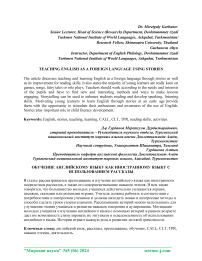Teaching English as a foreign language using stories
Автор: Gurbanov M., Gurbanova A.
Журнал: Мировая наука @science-j
Рубрика: Основной раздел
Статья в выпуске: 5 (86), 2024 года.
Бесплатный доступ
The article discusses teaching and learning English as a foreign language through stories as well as its improvement for reading skills. It also states the majority of young learners are really keen on games, songs, fairy tales or role plays. Teachers should work according to the needs and interests of the pupils and have to find new and interesting methods and ways to make lessons engaging. Storytelling can be used to enhance students reading and develop speaking, listening skills. Motivating young learners to learn English through stories at an early age provide them with the opportunity to stimulate their enthusiasm and awareness of the use of English. Stories play important role in child literacy development.
English, stories, teaching, learning, call, clt, tpr, reading skills, activities
Короткий адрес: https://sciup.org/140305019
IDR: 140305019 | DOI: 10.5281/zenodo.12545387
Текст научной статьи Teaching English as a foreign language using stories
While teaching we have to motivate our learners in different ways because of their character, way of learning. The majority of young learners are really keen on games, songs, fairy tales or role plays. Teachers should work according to the needs and interests of the pupils and have to find new and interesting methods and ways to make lessons engaging. Storytelling can be used to enhance students reading and develop speaking, listening skills. Motivating young learners to learn English through stories at an early age provide them with the opportunity to stimulate their enthusiasm and awareness of the use of English. Stories play important role in child literacy development. Stories guide us through our whole life - from the moment we were born and it does not change when we become teenagers or adults. When we are children, our parents tell us or read us stories and fairy tales. When we are older, we can hear stories in radio or watch them on TV. As pupils, we have to create our own stories at school from time to time. As adults, we watch soap operas or films, read books or magazine stories. Stories are for all of us, not just for children. We learn our mother tongue through stories. Therefore, it is natural to learn foreign language through them as well. Teachers should try to teach their students about language, life and culture through stories.
Stories told and read at home and school both entertain and educate young learners. Using stories in the classroom is fun, but the activity should not be considered trivial or frivolous. Indeed, there is strong support for storytelling in pedagogical theory. [1] Storytelling in English as a Second Language classrooms is often used informally by teachers to share cultural and personal information (e.g. telling English stories, or “growing-up” stories, or simply stories from one’s experiences to communicate an idea). More recently, however, storytelling has been promoted as an effective way to teach English to non-native speakers.
Список литературы Teaching English as a foreign language using stories
- Reasons To Learn A Language Through Story. I Will Teach You A Language. (2020). Retrieved from https://www.iwillteachyoualanguage.com/blog/learn-a- language-through-stories.
- Borich, J. (2020). Teaching Foreign Language Through Storytelling. Education Week. Retrieved from https://www.edweek.org/tm/articles/2012/04/02/tln_borich.html.
- Mixon, M., & Temu, P. (2006). First Road to Learning Language through Stories. English Teaching Forum, 44(2), 14.
- Mukhamedov, G. I., Khodjamkulov, U. N., Shofkorov, A. M., & Makhmudov, K. S. (2020). Pedagogical education cluster: content and form. ISJ Theoretical & Applied Science, 01 (81), 252.
- Saydakhmetova, D. (2020) Teaching Russian as a foreign language through stories. European Journal of Research and Reflection in Educational Sciences Vol. 8 No. 5, Progressive Academic Publishing, UK. Pp. 75-78.
- Teaching Russian through stories. Abc-russian.com. (2020). Retrieved from http://www.abc-russian.com/2014/12/teaching-russian-through-stories.html.
- Tyabaev, A., Sedelnikova, S., & Voytovich, A. (2015). Student-Centered Learning: The Experience of Teaching International Students in Russian Universities. Procedia - Social And Behavioral Sciences, 215, 88. DOI: 10.1016/j.sbspro.2015.11.578


